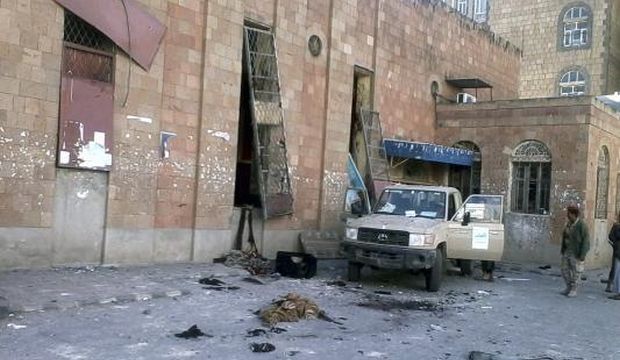
A soldier is seen outside a cultural center following a suicide attack in Ibb, central Yemen, on December 31, 2014. (Reuters/Stringer)
Sana’a, Asharq Al-Awsat—A suicide bomber killed 33 people and injured around 70 in the central Yemeni province of Ibb on Wednesday, as people gathered to celebrate the birthday of the Prophet Muhammad, according to officials.
The explosion took place at a student cultural center in the provincial capital, Ibb, where the Shi’ite Houthi movement had organized the event to mark the festival, celebrated by both Sunnis and Shi’ites but a more prominent event in the religious calendar among the latter.
Najib Al-Gharbani, a professor at Ibb University, told Asharq Al-Awsat the man was able to get through the security gates around the cultural center where the bomb exploded.
Security sources told Asharq Al-Awsat the suicide bomber was a man of Somali nationality.
No one has yet claimed responsibility for the attack, but it bears the hallmarks of being an operation by Al-Qaeda in the Arabian Peninsula (AQAP). The group has targeted the Houthis in a number of attacks since September.
Reports had earlier suggested Ibb’s governor had been killed in the attack but this has since been disproven.
Ibb, Yemen’s second-most populous province, is now under the control of the Houthis, who have strengthened their presence throughout the country—also taking control of its capital, Sana’a—since September.
Since then the Houthis have continued to expand across the country, while AQAP has increased its activities in the north, and the secessionist Al-Hirak movement has stepped up its calls in the south for the return of the independent state of South Yemen.
Many have accused the Houthis of receiving support from Iran and carrying out the Islamic Republic’s agenda in the region. Sources have told Asharq Al-Awsat Omani-mediated negotiations between the authorities in Sana’a and Tehran are currently ongoing to calm the situation in the country.
Meanwhile, a senior Yemeni political source told Asharq Al-Awsat much of the financial support Yemen has been receiving from its Gulf neighbors has been cut off since the Houthi takeover of Sana’a.
“The Houthis have taken over the central bank, most of the country’s key institutions, and several oil companies, and they are taking funds from them on a daily basis,” the source added.
Gulf neighbor Saudi Arabia, as well as the United States and the United Kingdom, are among some of the country’s biggest benefactors.
Some Yemeni officials have said the state’s finances are in such bad shape it will not be able to pay public sector workers’ salaries for January.
The economy of the country, which is already the poorest in the Arabian Peninsula, has tanked since September when Yemen was thrown into disarray after the Houthi advance.
Meanwhile, Sheikh Sadeq Al-Ahmar, the head of the country’s powerful Al-Ahmar tribe, has refused a request for arbitration in his dispute with the Shi’ite group.
The Houthis stormed homes belonging to Ahmar last week, in a move seen culturally repugnant in the deeply conservative and traditional country.
Tribal arbitration is a common method used to settle disputes between large factions, families, or tribes in the country. Seeking arbitration during a dispute is traditionally seen as an admission of wrongdoing.
The Houthis are reported to have sent over one hundred Kalashnikovs to Ahmar as a gesture of apology and goodwill, but the tribal chief sent the weapons back.
